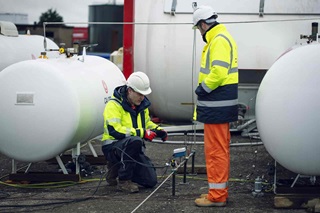The Adelante project has been awarded more than £170,000 of funding from the ‘Red Diesel Replacement’ competition, backed by the UK’s department for Business, Energy and Industrial Strategy (BEIS). The project will see Calor and Adelan deploy Adelan fuel cells, powered by Calor Futuria DME, in electrified construction platforms such as cherry pickers.
UK tax breaks that supported the use of ‘red diesel’ in agricultural and construction vehicles were eliminated in April 2022. Since then, especially with the price of diesel soaring, the construction sector has been looking for an alternative – with fuel cell generators increasingly seen as a viable option.
Adelan’s unique fuel cells are hydrogen-ready but can just as easily use here-and-now fuels such as LPG, Futuria DME or BioLPG, which are attracting significant market interest as a result.
Adelan, in partnership with Calor, will deploy its innovative mSOFC technology using Futuria fuels as an alternative to conventional internal combustion engines. The partnership will explore the fuel flexibility of Adelan’s mSOFC and renewable hydrocarbons, such as Futuria DME, as a low-carbon successor to diesel power.
Project Adelante will see Calor supply its Futuria DME as a 100% blend to Adelan for use in its fuel cell technology. Futuria DME has been shown to deliver CO2 savings of up to 74%1 compared to diesel. Adelan’s efficient fuel cells therefore offer an attractive solution as a diesel replacement for construction vehicles, as they are low-carbon, low-noise and produce no other air pollution. The project produces the optimal route to net zero construction plant by using both technology and low carbon fuels.
In addition to the use of fuel cells as a direct replacement for diesel engines, Adelan will also validate the potential for Calor’s Futuria DME fuel to be used in its generators. If successful, the application of Futuria DME could have wider benefits for the UK’s transition to clean energy, as it will enable Adelan’s technology to be deployed in the future at scale – using a clean fuel with a robust supply chain – rather than the uncertainty of future hydrogen supply chains and costs.
With the potential to be carbon negative in the future, Futuria DME is a drop-in alternative to LPG when used in fuel cells, meaning no changes to existing infrastructure or equipment are required.
The Adelante project will further strengthen the Calor and Adelan partnership. The two companies previously worked together to help replace diesel generators for low-carbon off-grid power generation. Calor continues to support the project, supplying Futuria Liquid Gas to Adelan fuel cell trials to replace diesel generators – particularly in Clean Air Zones – at a lower cost, with more straightforward storage and transportation options than hydrogen.
Commenting on this partnership, Alastair Lovell, Head of Sustainable Fuels at Calor, said: “With the construction sector accounting for almost a quarter of all global carbon emissions, a more sustainable replacement to diesel is needed.
“This exciting partnership will see Adelan’s technology explore the potential for renewable hydrocarbons such as Futuria DME within fuel cell technology, paving the way for more sustainable, cleaner energy source for the next generation of construction vehicles.
“This is just one of the many ways Calor is supporting different industries to make the transition to use more sustainable fuels, driving the change required for a better future, and meeting our aim to offering all our customers 100% renewable energy solutions by 2040.”
Adelan CEO, Dr Michaela Kendall commented: “Fuel cell technology offers a potent solution as a diesel replacement for construction vehicles. Low-pollution, low-carbon, low-noise and efficient, fuel cells present a host of benefits while Adelan’s patented hydrogen-ready technology allows equipment providers to be ready to take advantage of cleaner low-carbon fuels as they emerge.
“BioLPG is a renewable fuel that is chemically identical to LPG and Futuria DME is chemically similar. Both can help reduce local air pollution, as well noise and carbon, all achieved at lower costs than comparable diesel systems. These solutions will eliminate the need to wait for hydrogen supply capacity to build up, providing low-carbon off-grid power sooner, and at a fraction of the cost or hassle of hydrogen.”
Find out more about how Adelan is working with Calor here.
[1] https://publications.jrc.ec.europa.eu/repository/handle/JRC121213#:~:text=As%20an%20update%20of%20the,Europe%20in%202025%20and%20beyond[WT(M1]

 }
}
 }
}
 }
}
 }
}
 }
}
 }
}
 }
}